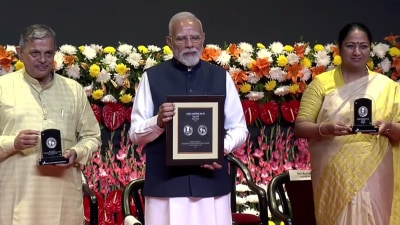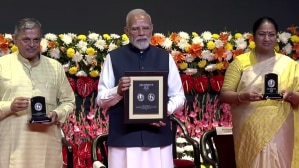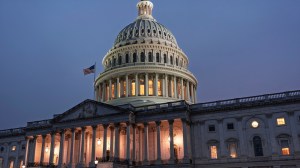It’s time to unwrap Vajpayee’s birthday gifts to the country
The Prime Minister celebrated his 78th birthday last week with his annual distribution of largesse. This time, he gave the villages of India...

The Prime Minister celebrated his 78th birthday last week with his annual distribution of largesse. This time, he gave the villages of India a drinking water scheme called Swajaldhara. In English this would roughly translate as ‘‘clean water stream’’ which is, at least, official acknowledgement that millions of Indians continue to lack access to this most basic of human needs. And, we dare to talk about nine per cent growth and being the 21st century’s emerging economic superpower!
More, though, about Atal Behari Vajpayee’s gifts. They sound good, with even the names rolling off the tongue like some ancient Sanskrit mantra, but once the announcement is made they usually end up buried, ignored and incomplete, in some government file.
But Mr Vajpayee continues to dish them out on his birthday, much as maharajahs did in days of yore. He appears not to have noticed the irony of a democratically elected leader, of proudly humble origins, making so barefacedly feudal a gesture but, more importantly, fails to notice that the problem lies not in the ideas department of his government but in the department of implementation.
This is especially true when it comes to implementing Swajaldhara-type development schemes and anti-poverty programmes designed for the rural poor. Mr Vajpayee’s own government pointed this out two years ago in a Planning Commission report, which admitted that much of the Rs 35,000 crore that the Central Government spends annually on anti-poverty programmes goes waste because it does not reach those it is supposed to benefit. Clearly, the Prime Minister has been too busy to read the report or he would be more circumspect about his birthday announcements.
It happens that on the day that he announced Swajaldhara, a massive report arrived in my mail from the Tribal Research and Training Institute in Pune. It was not one report so much as a collection of reports on various anti-poverty programmes at the village level and they made fascinating reading.
Listen to this critique of a ‘‘scheme for financial assistance to pregnant tribal women’’:
‘‘The survey reveals the looting of public resources meant for the poor by an unscrupulous bureaucracy in collusion with politicians… Said one ‘beneficiary’: ‘the foetus within me will curse the government doctor’. The looting continues because public funds are easy to rob and simple remedies to stop this are seldom applied because the loot is shared by those who see public office as a source of income and occupy it for that reason.’’
Out of an annual programme budget of Rs 272 lakhs, almost Rs 70 lakhs is misappropriated and people, including the beneficiaries, know this is happening.
What the report does not say is that the scheme is stupid in the first place because it puts in place a vast machinery to provide a paltry Rs 800 to pregnant women from Below the Poverty Line in the hope that they will use this to eat enough food to produce a healthy baby.
The women are mostly illiterate, so they have no idea that the money is meant for them and, in any case, since their families are as poor and hungry as they are, go home and share it with the rest.
Since it is on senseless schemes like this that thousands of crores of taxpayers’ money get spent, is it any wonder that officials and politicians pocket most of it along the way? The tribal research institute has come up with hundreds of other stories of how money is made by looting the poor.
So, in a watershed development scheme, six per cent of the funds were stolen by using simple, thieving tactics like using tractors to work the land and charging the government for labour costs. The thieving is so shameless that money has been looted even from schemes meant for starving children.
So, instead of announcing yet another development scheme, the best birthday present the Prime Minister could have given us was to announce an investigation into all rural anti-poverty and development schemes. Most of them are so futile that even had he announced an end to them the only sufferers would have been the officials who live off them.
Swajaldhara will almost certainly be more of the same, so how about transforming it into an investigative exercise to discover why every village in India does not already have clean drinking water. Even as I write this, I notice that the Prime Minister is off on his annual New Year holiday.
May I recommend that the best holiday reading for him could be his own government’s reports on the mess in rural development. He might find them sobering enough to desist from announcing any more schemes and might also put an end to his dreams of nine per cent economic growth.
The rural poor (and we speak here of the majority of India’s population) have been sold enough dreams in 50 years of feudal socialism. What we need now is some realism. So here is a New Year thought. No matter how much computer software we produce, no matter how much we project ourselves as a knowledge economy and an emerging superpower, it will make little difference if 55 years after Independence, the Prime Minister still needs to promise, yet again, that every village will have clean drinking water. Could he promise instead to find out why this has not already happened? Meanwhile, Happy New Year Mr Prime Minister.
Write to tavleensingh@expressindia.com



- 01
- 02
- 03
- 04
- 05




























